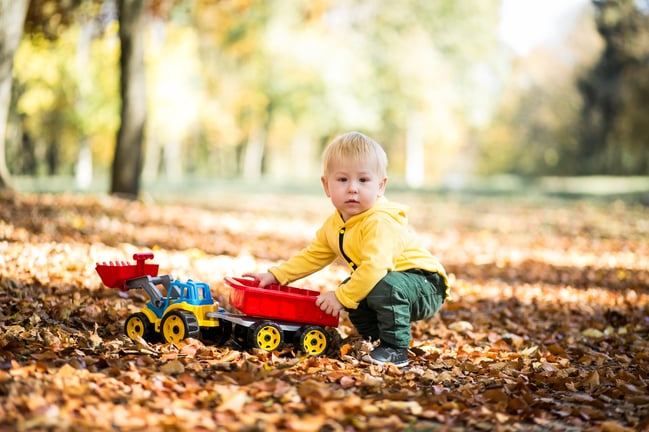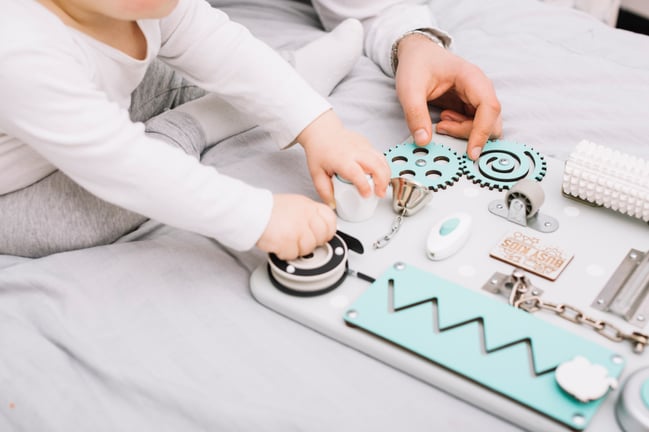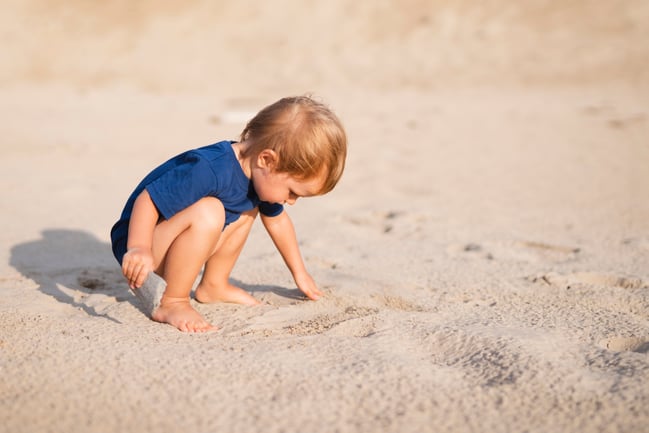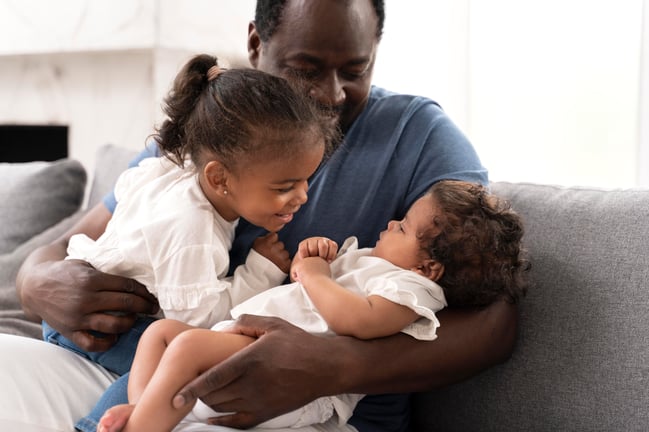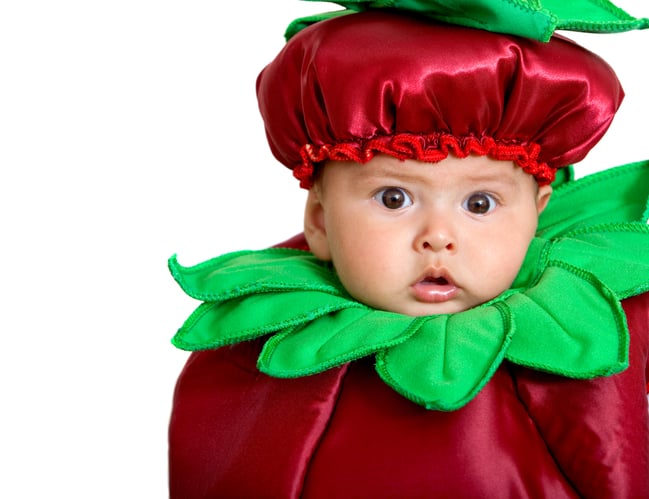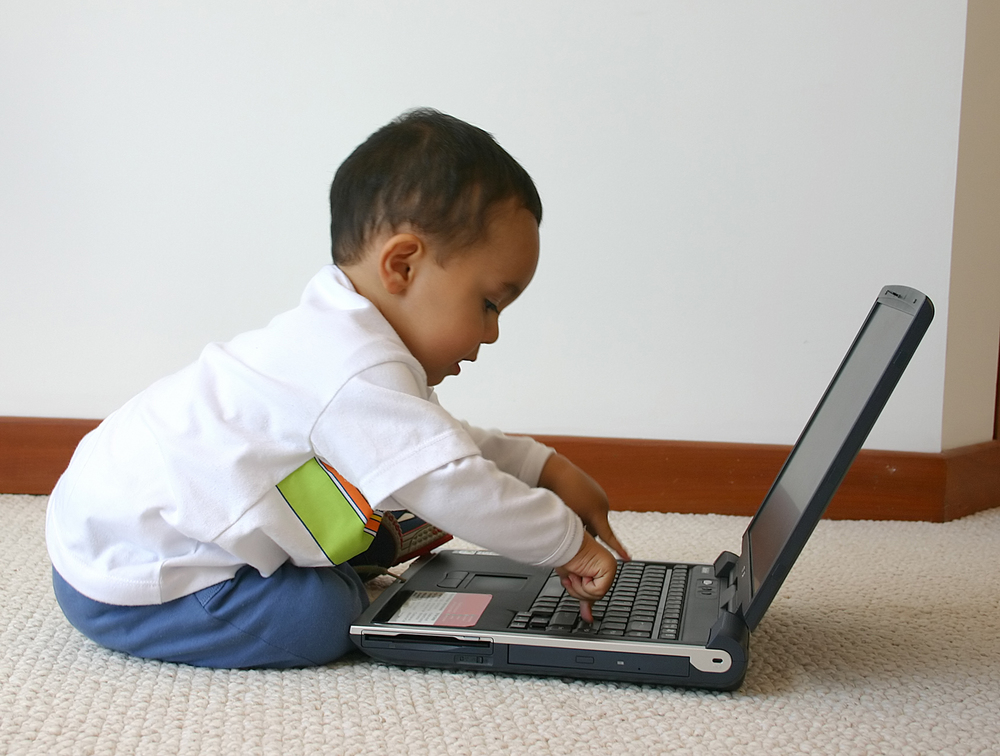
Cognitive Development
Younger Toddlers (8 to 21 months)
Components and Developmental Indicators
Younger Toddlers (8 to 21 months)
Components and Developmental Indicators
Developmental Indicators
CD Goal-1: Through their explorations, play, and social interactions, children use their senses to discover and construct knowledge about the world around them.
![]()
Actively explore objects by handling them in many ways (moving, carrying, filling, pouring, smelling, and putting in mouth).
![]()
Explore space with their bodies (fit self into large box, crawl under table, climb over objects).
![]()
Link actions together in simple combinations (put cover on pot, put doll in crib and rock).
AL Goal-2: Children actively seek to understand the world around them in play and everyday tasks.
![]()
Search in several places where an object has been hidden.
![]()
Notice a change in familiar objects, places, or events (reach to touch hair when parent comes home with new haircut, look for furniture that was moved).
![]() Perform routine events and use familiar objects in appropriate ways (carry clean diaper to changing table, talk on phone, “water” plants with pitcher).
Perform routine events and use familiar objects in appropriate ways (carry clean diaper to changing table, talk on phone, “water” plants with pitcher).
![]()
Explore how things work and how to cause an effect using repeated actions, such as pushing the button to make the character pop out of the toy.
![]()
Try several solutions to everyday challenges or problems until finding a strategy that works. May repeat a strategy even if it is not working.
![]()
Imitate behaviors they have seen in the past or in other places.
![]()
Identify objects and people in pictures by pointing or looking.
![]()
Use simple pretend play actions (pretend to sleep and eat).
CD Goal-3: Through their explorations, play, and social interactions, children demonstrate the ability to think about their own thinking: reasoning, taking perspectives, and making decisions.
![]()
Show awareness of others’ feelings about things by looking to see how they react.
![]()
Show awareness of another person’s actions and intentions by imitating actions or looking to adult to meet another’s need.
Developmental Indicators
CD Goal-4: Through their explorations, play, and social interactions, children count with understanding and use numbers to tell how many, describe order, and compare.
![]()
Use words or actions that show understanding of the concepts of “more” and “all” (ask for more food, stop asking for more blocks when told they have “all” of the blocks).
![]()
Explore quantity (filling and dumping containers).
![]()
Recognize the difference between two small sets of objects (6 or under) that include a different number of objects (point to which set of crayons has more).
CD Goal-5: Through their explorations, play, and social interactions, children demonstrate concepts about position, as well as identify and describe simple geometric shapes.
![]()
Explore space with their bodies (fit self into large box, crawl under table, climb over low walls).
![]()
Put basic shapes into a shape sorter using trial and error.
![]()
Match square shapes and circle shapes.
CD Goal-6: Through their explorations, play and social interactions, children compare, sort, group, organize, measure, and create simple patterns using concrete objects.
![]()
Participate in activities that compare the size and weight of objects.
![]()
Show awareness of different categories during play (put balls in a box and dolls in a bed, give one friend all the cars and another friend all the trucks when playing in the block area).
CD Goal-7: Through their explorations, play, and social interactions, children use mathematical thinking to ask questions and solve problems.
![]()
Begin to cluster objects that share physical similarities (balls grouped together and blocks grouped together).
![]()
Match relational parts, such as a teapot and its lid or a pan with a spoon to stir.
Developmental Indicators
CD Goal-8: As a result of their explorations and participation in simple investigations through play, children observe, describe, and demonstrate respect for living things, the environment, and the physical world.
![]()
Show curiosity in observing and exploring the natural world indoors/outdoors with focus, using all senses (notice and play with rocks brought in from a walk, smell flowers, catch falling snow, shuffle through leaves).
![]()
Point to objects and actions they find interesting in the world around them.
![]()
Collect groups of items (put rocks and pinecones in a bucket).
CD Goal-9: As a result of their explorations and participation in simple investigations through play, children demonstrate their ability to use scientific inquiry by observing, manipulating objects, asking questions, making predictions, and developing generalizations.
![]()
Use all senses to examine the environment carefully (reach out to touch rain, stop playing to watch shadows, gaze at moon).
![]()
Manipulate objects to make things happen (kick a ball, push a button on a toy) and delight in repeating and seeing similar results.
![]()
Explore objects and materials, handling them in many ways to discover more things they can do with them (move, carry, fill, dump, squish and pound wet sand).
![]()
Say, “Look!” for others to share in discoveries.
Developmental Indicators
CD Goal-10: Through their explorations, play, and social interactions, children demonstrate an understanding of relationships, roles, and what it means to be a participating member of their families and the diverse groups/communities they belong to.
![]()
Imitate routine actions of adults (rock a baby doll, push a lawnmower, “read” a magazine).
![]()
Know whom they can go to for help and emotional ‘refueling’ (periodically seeking out primary adult before going back to play with peers).
![]()
Bring toys to share with primary adult.
![]()
Recognize children and others they spend a lot of time with (make sounds, say name or hug).
![]()
Sit next to another child when playing with own toys.
CD Goal-11: Through their explorations, play, and social interactions, children identify and demonstrate appreciation of similarities and differences between themselves and others.
![]()
Compare their own physical features with those of others by looking and touching.
![]()
Explore similarities and differences among people by listening to their voices, feeling their hair, touching their faces, and watching their expressions.
CD Goal-12: Children engage in a variety of creative activities for enjoyment and self-expression including play, visual arts, music, expressive movement, and drama.
![]()
Explore art materials freely (make marks, squeeze clay, tear paper).
![]()
Use hats and clothes for dress-up make-believe.
![]()
Use materials purposefully to create sounds (bang blocks together, ring bell, shake a can to make contents jingle).
![]()
Move to music in their own way (swaying to music with feet wide apart).
CD Goal-13: Children demonstrate an appreciation for different forms of art including visual arts, music, expressive movement, and drama.
![]()
Show interest or pleasure in response to images, objects, and music (say, “Aaah” and reach for a brightly colored picture, look at or reach toward fluttering leaves).
![]()
Participate in and explore all possible media (use finger paint, glue scraps of paper on another paper, dance to music).

